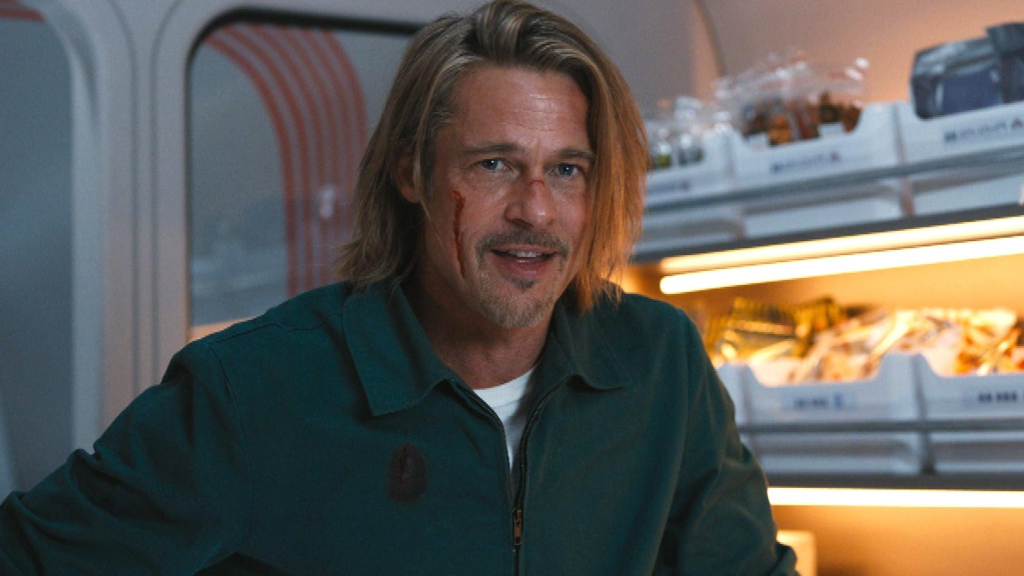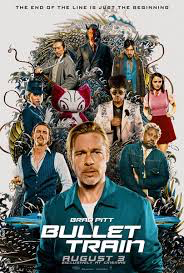Bullet Train

Bullet Train offers all the heady, irreverent escapism of a summer blockbuster that David Leitch is so adept at delivering: kinetic yet studiously controlled stunts, a prickly wit juxtaposed by delightfully extreme violence, hyper-stylised worldbuilding, and, sugarcoating it all, a gleeful Brad Pitt, leaning into the latter stage of his career with the glimmer of a man who knows he is still, at 58 years of age, the biggest box office draw in the land.
Adapted from the novel of the same name by Japanese author Kōtarō Isaka, Bullet Train charts the looping arcs of disparate assassins on board the eponymous bullet train from Tokyo to Kyoto. Brad Pitt’s Ladybug, who suffers from a self-diagnosed, wallowing rotten-luck syndrome, amounts to the narrative anchor of this revolving belt of killers, which includes Tangerine and Lemon (Aaron Taylor-Johnson and Brian Tyree Henry, respectively) – spiritual twins whose binding support for West Ham United is brilliantly referenced through needle drops of I’m Forever Blowing Bubbles, with different renditions corresponding to different emotional beats. Further along is Joey King’s Prince, a ruthless assassin posing as a jumpy schoolgirl, who lures Andrew Koji’s Yuichi Kimura onto the train by nearly killing his son and intentionally leaving a trail of breadcrumbs that leads him to her seat. The Prince thus hopes to use him as the proxy assassin of his employer, notorious crime kingpin the White Death, played with reserved menace by Michael Shannon.
The enigma of Shannon’s White Death and the age-old MacGuffin of a much-desired briefcase serve as the two things that unite the assassins’ motivations and catalyse their brutal carriage battles. The film is thus a device-laden odyssey, stopping off at such stations as Train to Busan, Snowpiercer, Ronin and From Russia with Love, among other picturesque destinations.
Like Ronin, Bullet Train largely overcomes the somewhat convoluted mechanics of its plot with the intensity of its action set pieces, the setting of the train providing ample opportunity for Leitch to push the boundaries of his craft, taking the precise stunt coordination of John Wick and Atomic Blonde and refreshingly breathy photography in new and exciting directions. Like these two films, Bullet Train also operates on an appealingly heightened plane of reality, with neon, cyberpunk visions of urban Japan yanking viewers into a carefully, richly constructed world.
Populating it are characters brought to life by great performances. Taylor-Johnson and Henry share onscreen chemistry that will undoubtedly be seen again in the years to come; King is clearly having fun with the manipulative streak of her character, while Pitt makes full use of his knack for comedic timing accompanied by his characteristically soulful screen presence.
However, it’s a world that can only immerse you for so long, and, with a runtime of just over two hours, this pulpy, device-driven caper does perhaps outstay its welcome by the time the noise of its indulgent final act rolls in. Leitch’s penchant for playing with narrative form can also lead to some harsh bumps on the track.
Though the director has described Bullet Train “a meditation on fate”, it is not. What it is, though, is a satisfying, energetic ride into the heart of nothing much but the joy and escapism of action thrills and spills.
Matthew McMillan
Bullet Train is released nationwide on 3rd August 2022.
Watch the trailer for Bullet Train here:
























Facebook
Twitter
Instagram
YouTube
RSS